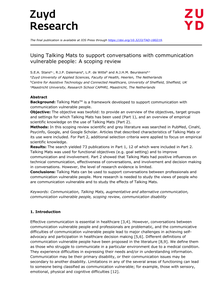Background: Talking Mats is a framework developed to support communication with communication vulnerable people. Objective: The objective was twofold: to provide an overview of the objectives, target groups and settings for which Talking Mats has been used (Part 1), and an overview of empirical scientific knowledge on the use of Talking Mats (Part 2). Methods: In this scoping review scientific and grey literature was searched in PubMed, Cinahl, Psycinfo, Google, and Google Scholar. Articles that described characteristics of Talking Mats or its use were included. For Part 2, additional selection criteria were applied to focus on empirical scientific knowledge. Results: The search yielded 73 publications in Part 1, 12 of which were included in Part 2. Talking Mats was used for functional objectives (e.g. goal setting) and to improve communication and involvement. Part 2 showed that Talking Mats had positive influences on technical communication, effectiveness of conversations, and involvement and decision making in conversations. However, the level of research evidence is limited. Conclusions: Talking Mats can be used to support conversations between professionals and communication vulnerable people. More research is needed to study the views of people who are communication vulnerable and to study the effects of Talking Mats.
DOCUMENT

This study focuses on revealing and developing personal constructs regarding problem behaviour in classrooms. Twenty-nine teachers (initial and in-service students) took part in the project. The main idea is that teachers opinions about their pupils and themselves influence the way they act in their classrooms. Their thoughts and ideas about students - their personal constructs - are generally unconscious. To clarify and to develop teachers constructs, we used Kellys repertory grid technique and Garmans reflective approach. Both methods give a powerful impulse to the development of thinking and acting of teachers. They can use the experiences as an integral part of their own action research. & I am one of the teachers who took part in the constructs research.A personal set of fifteen constructs on twenty-eight pupils was collected. These constructs showed me what kinds of constructs I have (mainly social-emotional and cognitive ones) and made me reflect. They also made clear to me that I think less positively on problem children. Participation in this research includes coaching, theoretical orientation and continuous reflection, making me conscious of what (problem) behaviour I like or dislike and what I should change to get a professional, holistic view. Then problem behaviour will be more easily tolerated by me and I can teach my colleagues about my new insights in intercommunicative sessions and by personal counselling.
DOCUMENT

The purpose of this literature study is to obtain information about educational approaches to teaching 11 to 12 years old children focusing on how to distinguish between real news and fake news. With this purpose we studied 16 academic papers about learning activities to make primary school children media-literate and able to recognise fake news. What we found is that having children create their own news messages seems to be the most effective approach. News messages that they create can be text messages as well as videos, audios, pictures and animations. Based on this conclusion, students from The Hague University of Applied Sciences Teacher Training Institute (PABO) have been asked to develop a set of learning materials that can be used for instruction in primary schools. The effectiveness of those materials is currently being tested at an elementary school in Rijswijk. The results of the literature and the field study will be shared in the Dutch centre of expertise for media literacy education, Mediawijzer.net.
MULTIFILE
